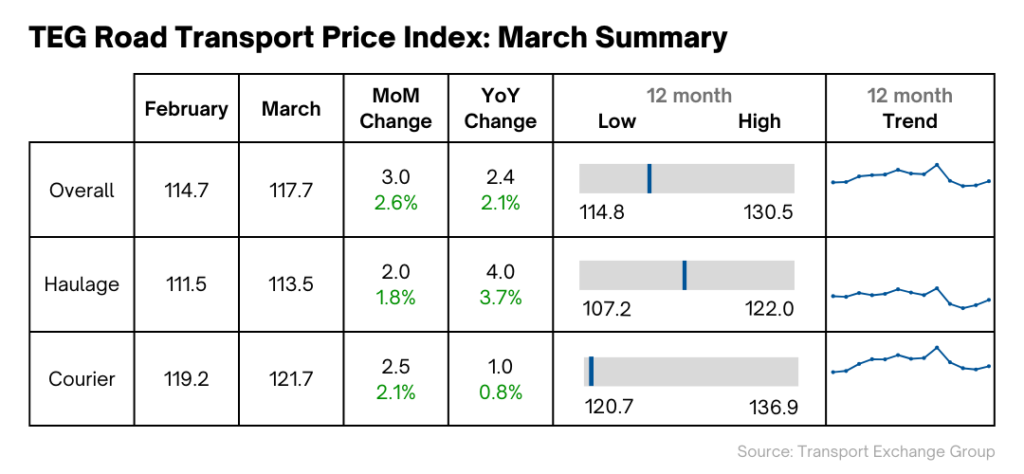Road Transport Price Index – March ’24
5th April 2024
Road transport prices start to creep up, following declining prices in January and February
The latest data from the TEG Index shows haulage and courier prices are starting to rise, increasing by 3.2 points overall in March 2024.
Integra makes sense of the road transport landscape. Get more insight with Integra, TEG’s enterprise solution.
TEG Road Transport Price Index - Trends at a glance
The latest data from the TEG Road Transport Price Index reveals that haulage and courier prices have increased in March. This comes following two consecutive months of price declines in January and February.
The overall price index has increased by 3.2 points, to reach 117.7, in the last month. This marks an increase in prices year-on-year, by 2.9 points. Prices have increased in March every year since the beginning of the index in 2019. After the rush of the busy season, where prices reach their peak in December, January and February often bring much lower average prices. Trends show that, in March, prices start to rise again.
The price increases seen across haulage and courier vehicle services were not significant, with haulage prices rising by 2 points and courier prices by 2.5 points.
Year-on-year data tells a different story, with courier prices rising 1 point, whilst haulage prices have increased by 4 points.

Industry pulse
As we get further into 2024, haulage and courier prices continue to follow expected trends, falling at the beginning of Q1 and starting to rise as we move into Q2.
The latest Spring Budget announcements will positively affect the road freight sector, particularly through changes to fuel duty.
The government’s efforts cannot stop there, however, as questions have arisen regarding new border control systems as part of Brexit, due to come into effect on 30th April.
Fuel watch
Fuel prices continue to rise for the second consecutive month. This change has been brought about by a jump in the price of oil.
Petrol prices have risen by 1.86% over March, whilst diesel prices have risen by 1.91%. Fuel prices do, however, remain lower year-on-year, particularly diesel, which currently sits 7.4% lower than in March 2023.
Fortunately for millions of drivers, the temporary 5p duty cut for petrol and diesel has come into effect. The Chancellor Jeremy Hunt announced this year-long extension at the Spring Budget, saving car drivers around £50 this year and £250 since the 5p cut was introduced.
Spring Budget brings some support for haulage and courier sector
The positive announcement that most directly affects drivers and fleet owners is, of course, the fuel duty freeze. Extending full expensing to leased vehicles and assets will significantly support hauliers and other large vehicle drivers, especially those affected by higher interest rates.
However, with record numbers of haulage firms collapsing last year and the trend continuing, many in the industry were hoping for a temporary suspension of the HGV Levy and VED on HGVs.
Incentives for taking up alternative fuels would also be welcomed, as the pressure to go green mounts, but the challenges and costs remain.
Brexit concerns resurface, years later
For years, Brexit was a topic of major concern among the logistics industry, and it seems that new worries are arising.
The UK government's lack of clarity on post-Brexit border arrangements with the EU is causing concern and confusion among logistics industry players. Without clarifying arrangements, logistics professionals fear major delays, impacting food imports from Europe.
Full border controls will start from the end of April, but many are not clear on how the system works.
The industry requires information from the Government to prevent potential disruptions to the supply chain and avoid empty shelves.
In summary
After the price fall typically seen in early Q1, road freight prices are starting to climb. Service users should be aware of this, however, the changes over the past month have not been drastic.
Fuel prices continue to rise for the second month in a row, which could further contribute to rising haulage and courier prices in the coming months, as the two are intrinsically linked. Still, prices remain lower year-on-year, and the changes to fuel duty should act to moderate any impending price hikes.
Want to see more in depth data? Click below to visit the Integra Market Data report
Share this post on LinkedIn

